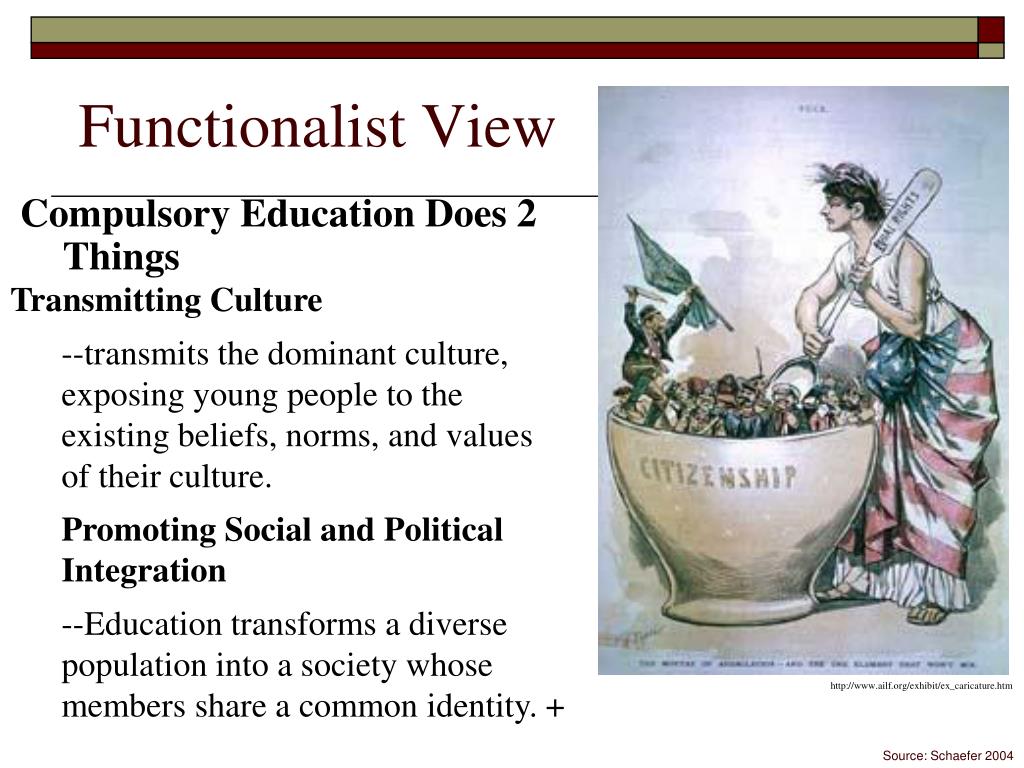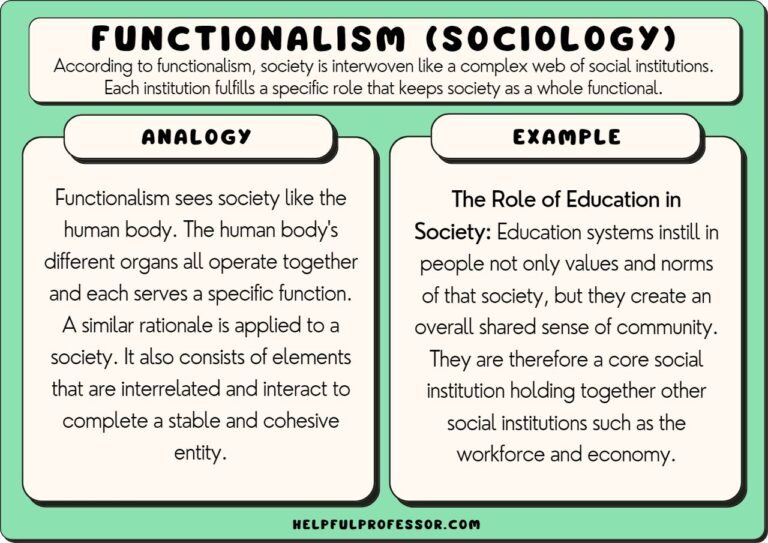Remember the first time you walked into a classroom? The smell of old paper and chalk, the rows of desks facing the front, the teacher’s authoritative presence – it felt like stepping into a microcosm of society itself. This feeling, this sense of structure and order, is the very essence of the functionalist perspective on education. It views education as a crucial social institution meticulously designed to prepare individuals for their roles in society.

Image: www.slideserve.com
Whether we realize it or not, education is woven into the fabric of our lives. From the early days of play-based learning to the rigorous academic challenges of higher education, it shapes our experiences, perspectives, and ultimately our place in the world. The functionalist view explores these deeper societal implications, recognizing education not just as a means to acquire knowledge but as a powerful tool for maintaining social harmony and promoting progress.
Understanding the Functionalist Lens
A Glimpse into the Past
The functionalist perspective emerged in the late 19th and early 20th centuries, with sociologists like Emile Durkheim and Talcott Parsons emphasizing the importance of social order and stability. They saw education as a crucial mechanism for achieving these goals, transmitting societal values, skills, and knowledge to younger generations.
Key Concepts
The functionalist view of education rests on a few core concepts:
- Socialization: Education instills social norms, values, and beliefs, ensuring individuals contribute effectively to society.
- Social Control: Schools enforce rules, discipline, and conformity, maintaining social order and stability.
- Role Allocation: Education prepares individuals for different roles and occupations, ensuring a smooth functioning of the social system.
- Skills Development: Schools equip students with the knowledge and abilities necessary to succeed in the workforce and contribute to economic growth.

Image: helpfulprofessor.com
Manifest and Latent Functions
Functionalists distinguish between manifest and latent functions of education. Manifest functions are the intended and recognized outcomes, such as teaching reading, writing, and arithmetic. Latent functions, however, are unintended or less obvious, like socializing students into shared values and building social connections through extracurricular activities.
Dissecting the Functionalist View
The Benefits of a Structured System
The functionalist perspective emphasizes the positive contributions of education to society. It argues that a structured education system promotes social cohesion, ensures the transfer of vital knowledge and skills, and helps individuals find their place in the workforce. A well-functioning education system, from this perspective, is essential for a smoothly operating society.
Criticisms and Limitations
However, the functionalist view isn’t without its critics. Opponents point to the limitations of its focus on social order and stability, arguing that it overlooks:
- Social inequality: The functionalist perspective often fails to adequately address issues of class, race, and gender disparities in access to quality education.
- Power dynamics: Critics argue that the focus on social order can obscure the ways in which education systems can be used to reinforce existing power structures.
- Individuality and creativity: By emphasizing conformity and standardized testing, the functionalist view might stifle individual creativity and critical thinking.
The Role of Education in a Globalized World
In a rapidly changing world characterized by technological advancements and globalization, the functionalist view of education faces new challenges. While the core principles of socialization, social control, and skills development remain relevant, the focus has shifted to preparing students for an increasingly complex and interconnected world. This necessitates a re-evaluation of educational priorities, emphasizing skills like critical thinking, adaptability, and collaboration, which are essential for success in a globalized economy.
Navigating the Functionalist Landscape
Adapting to a Changing World
Education systems need to adapt to the evolving needs of society. This means paying attention to emerging trends, such as the rise of artificial intelligence, the importance of lifelong learning, and the need for cross-cultural collaboration. By incorporating these elements into curricula, institutions can equip students with the skills they need to thrive in a rapidly changing world.
The Importance of Critical Thinking
While social order and skills development are vital, it’s crucial to foster critical thinking within a functionalist framework. Students should be encouraged to question, analyze, and challenge existing social structures and norms. This encourages active participation in shaping a more equitable and progressive society.
Embracing Diversity and Inclusivity
The functionalist view must evolve to account for the realities of diversity and inclusivity. Education systems should strive to provide equal opportunities for students from all backgrounds, regardless of their race, gender, socioeconomic status, or ability. This involves addressing systemic biases and creating a truly equitable learning environment.
FAQs about the Functionalist View of Education
Q: What are the main criticisms of the functionalist view of education?
Critics argue that the functionalist view overlooks the ways in which education can perpetuate social inequality, reinforce power structures, and suppress individual creativity. They also point out that it doesn’t adequately address the needs of a rapidly changing world and the evolving demands of the globalized workforce.
Q: Does the functionalist view still hold relevance in the modern world?
While the functionalist perspective has its limitations, its core principles, such as socialization, skills development, and the importance of social order, remain relevant. However, it needs to be modified to account for the changing needs of society, embracing diversity, fostering critical thinking, and preparing students for a globalized world.
Functionalist View Of Education
What’s the Future of Education?
The functionalist view of education, despite its criticisms, offers a valuable framework for understanding the role of education in society. As we navigate the complexities of a rapidly changing world, we must continue to refine and adapt this perspective to ensure that education empowers individuals to become responsible citizens, contribute to a thriving society, and shape a brighter future.
Are you interested in learning more about the functionalist view of education? Share your thoughts and questions in the comments below!



/GettyImages-173599369-58ad68f83df78c345b829dfc.jpg?w=740&resize=740,414&ssl=1)


